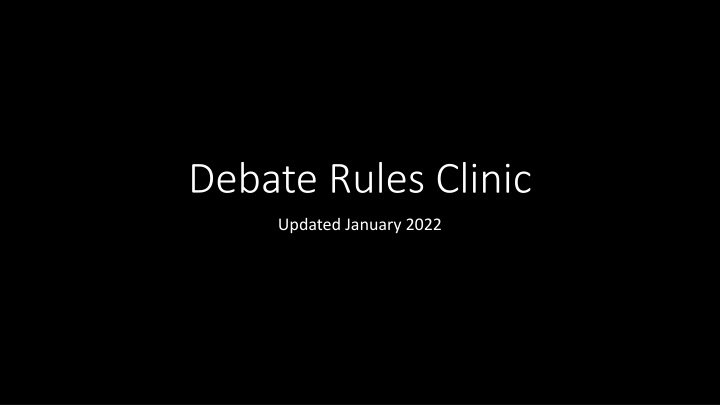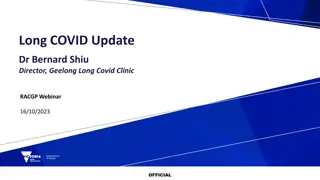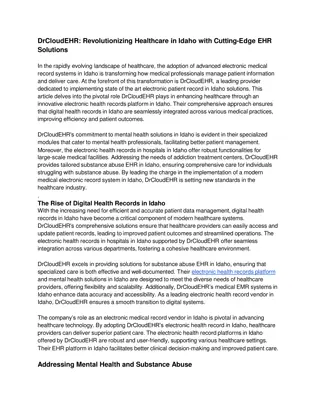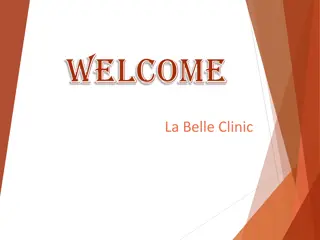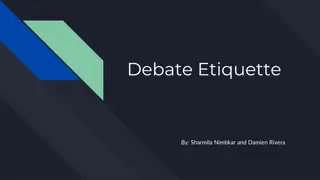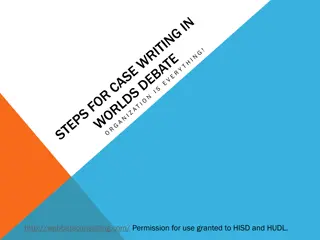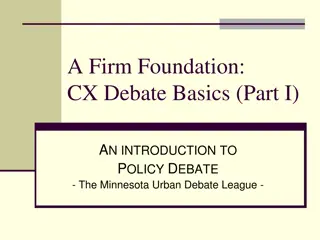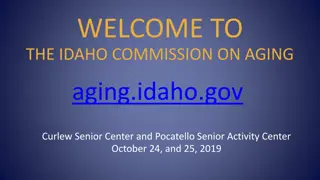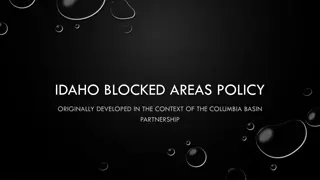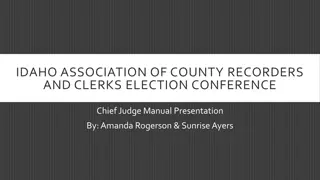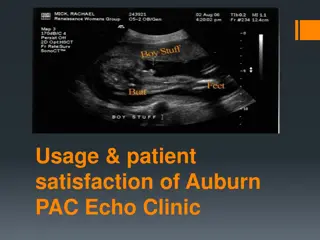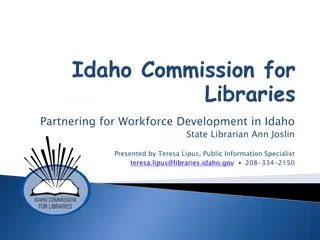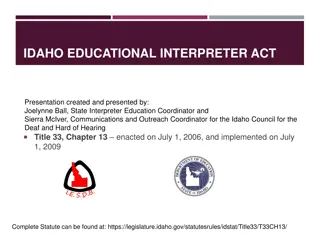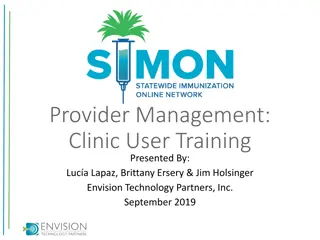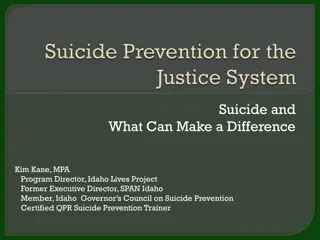Idaho Debate Rules Clinic Overview
An overview of the Idaho Debate Code, emphasizing the importance of following the rules, proper judging procedures, evidence availability, and general guidelines for both judges and debaters. The presentation highlights key resources, such as the Idaho Rules Manual and Judge Resource Website, and stresses the significance of adherence to the debate code in both Districts and State competitions.
Download Presentation

Please find below an Image/Link to download the presentation.
The content on the website is provided AS IS for your information and personal use only. It may not be sold, licensed, or shared on other websites without obtaining consent from the author.If you encounter any issues during the download, it is possible that the publisher has removed the file from their server.
You are allowed to download the files provided on this website for personal or commercial use, subject to the condition that they are used lawfully. All files are the property of their respective owners.
The content on the website is provided AS IS for your information and personal use only. It may not be sold, licensed, or shared on other websites without obtaining consent from the author.
E N D
Presentation Transcript
Debate Rules Clinic Updated January 2022
What this Presentation is: An overview of the most pertinent rules A step in the State Certification Process What this presentation is not: An overview of all the debate rules An introduction to judging debate A substitution for a judging clinic Exciting Download/print/ look at a copy of the Idaho Debate Code from Isata.org. This is different from the IDHSAA Rules. All judges MUST follow the Idaho Debate Code (IDC) at both All judges MUST follow the Idaho Debate Code (IDC) at both Districts and State. Districts and State.
Key Resources Idaho Rules Manual/Idaho Debate Code: https://drive.google.com/file/d/1ZWzR1YxTTE6s3wPr7Px7giN0BDV- roCY/view?usp=sharing Judge Resource Website: https://sites.google.com/boiseschools.org/idahodebatejudging
The Idaho Debate Code is available to anyone and can be found on our Judging Website. You should refer to Chapter 7 for Evidence Violation Information. Judges who are not assigned a round should wait for a reassignment from Tab. General Judging Procedures Ballots should be completed in a timely manner with appropriate feedback. The judge's decision should be based on the arguments presented in round and NOT include their own opinions and beliefs on the topic. While debaters should try to adapt to a judge's paradigm, failure to do so should not constitute losing the round.
When judging as a panel (with multiple judges) judges should NOT discuss their decision before completing their ballot Debaters must make all evidence - electronic or hardcopy - available to opponents in a timely manner. General Judging Procedures Debaters may paraphrase a credible piece of evidence. Debaters are responsible for evidence availability if a laptop experiences a loss of power. Any questions on judging procedures or elements should be directed to the Tab Room.
Judges do not have the authority to disqualify a debater who violates the rules Judges may use a timekeeper OR debaters may time themselves General Rules and Regulations Judges should not provide oral feedback to students before submitting their ballots. Judges should not interject in the round for any reason Judges should not stop the round except for emergencies and formal evidence violations
Prior to break rounds, observers must be affiliated with one of the participating schools Observers in rounds may flow and take notes. General Rules and Regulations Debaters may use laptops to look up research online during the round In LD and PF, two debates are flighted (paired) to create a single round of judging. In ANY Style: Debaters MAY introduce new evidence in rebuttal speeches but they MAY NOT introduce new arguments.
Policy Debate Rules Clinic
Policy Debate is a 2 person team debate The Affirmative will propose a specific policy proposal that the United States should adopt. What is Policy Debate? The Negative will attempt to demonstrate why that policy should not be adopted by the United States Government Policy Debate often uses specific jargon and ideas but students should be able to adapt to any judging audience. For more information see the Introduction to Judging Policy Debate Video on our judging website.
The affirmative team MUST present a specific plan or advocacy in the first Affirmative Constructive (1AC) Each debater must give one and only one constructive speech, one period of questioning, one period of answering, and one rebuttal speech. Policy Debate: Key Points to Remember Debaters are permitted a 10 second untimed roadmap The Negative team does not have to present a competing plan or a counterplan. There are many different negative strategies. Topicality Arguments and Counterplans, if presented by the Negative, must be presented in the 1NC
Public Forum Debate Rules Clinic
Public Forum Debate is a 2 person team debate What is Public Forum Debate? The focus should be on persuading a non-expert citizen judge Combines communication skills with argumentation skills in a generalized debate. For more information see the Introduction to Judging Public Forum Debate Video on our judging website.
In Public Forum, neither the Pro (affirmative) nor the Con (negative) are permitted to present formalized plans (or counterplans). In Public Forum, either side may offer reasoning to support a position of advocacy. Debaters may offer generalized, practical solutions. Public Forum Debate: Key Points to Remember Rounds begin with competitors flipping a coin to determine sides/speaking order In crossfire, both opponents ask and answer questions During Grand Crossfire, all four debaters may ask and answer questions Summary Speeches and Prep Time is 3 minutes
Lincoln Douglas Debate Rules Clinic
Lincoln Douglas Debate is a solo debate event What is Lincoln Douglas Debate? The affirmative will uphold the resolution. The negative must disprove the affirmative. Lincoln Douglas uses Values and Value Criteria as a framework for the debate. Debaters may have competing frameworks. For more information see the Introduction to Lincoln Douglas Debate Video on our judging website.
The Affirmative MUST present a value judgement in relation to the resolution Lincoln Douglas Debate: Key Points to Remember The Affirmative always speaks first and last In Lincoln Douglas Debate, the use of formalized plans and counterplans is permitted. Lincoln Douglas Debate includes 4 minutes of Prep The Negative Debater may offer a counter value and/or negate the affirmative position.
Congressional Debate Rules Clinic
Congresspersons receive points when they give a speech, although questions and motions may be taken into consideration in the judges final ranking. Congressional Debate: Key Points to Remember All Congress speeches, including authorship speeches, may last up to 3 minutes Congresspersons may paraphrase general philosophical arguments without evidence but must follow the Evidence rules in all other respects Congress entertains multiple bills or resolutions in a single session
The Presiding Officer should alternate recognizing affirmative and negative speakers for each bill or resolution The Presiding Officer should be awarded points while acting in their position. (1 hour of Presiding is equal to 1 speech) Congressional Debate: Key Points to Remember Congressional Debate will use Direct Questioning which allows students the opportunity to ask multiple questions. Speakers should indicate a desire to speak by raising their placard for recognition by the presiding officer. (Not Standing)
Evidence violation procedure is used ONLY when a student makes a specific, intentional, directed allegation. Credibility, accuracy, and verifiability of evidence can be addressed in speeches without an evidence allegation. You MAY ask to clarify if a student is making a FORMAL evidence allegation between speeches. Evidence Violations
Informal Evidence Allegations Level 1 The DEBATER makes an informal allegation for: Incorrect or no citations (oral and/or visual) Incorrect or no textual demarcation (oral and/or visual) The JUDGE examines the evidence at their convenience and uses it at their discretion in the RFD The ROUND continues to the end without disclosure The BALLOT notes how the allegation whether or not accepted weighs into the RFD Level 2 The DEBATER makes an informal allegation for: Inserting ellipses Failing to identify a straw argument The ROUND pauses while the judge examines the evidence. It ends immediately if a violation occurred. It continues to the end if no violation occurred. The JUDGE immediately discloses whether or not a violation occurred. A violation ends with a loss and zero points to the accused debater(s). No violation ends with no penalties to either team (7.4B). The BALLOT notes the decision on the alleged violation. The decision only weighs into the RFD if a violation occurred.
Formal Evidence Allegations Level 3 The DEBATER makes a formal allegation for: Clipping Evidence The ROUND ends immediately and the judge examines the evidence The JUDGE discloses whether or not a violation occurred. A violation ends with a loss and zero points to the accused debater(s). No violation ends with a loss and zero points to the accusing debater(s) The BALLOT notes the decision on the alleged violation and which team received the loss with zero points Level 4 The DEBATER makes a formal allegation for: distorting evidence (7.2A) nonexistent evidence (7.2B) including unable to provide original source when requested (7.2B1) original source provided does not include evidence cited (7.2B2) evidence paraphrased lacks original source to verify accuracy declines to provide evidence in timely fashion (7.2B4) The ROUND ends immediately and the judge examines the evidence The JUDGE discloses whether or not a violation occurred. A violation ends with a loss and zero points to the accused debater(s). No violation ends with a loss and zero points to the accusing debater(s) The BALLOT notes the decision on the alleged violation and which team received the loss with zero points
Evidence Rules: Key Points If a FORMAL evidence violation allegation occurs, one side will receive a loss- depending on the outcome of the allegation Debaters must make ALL evidence- electronic or hardcopy- available to both the opponents and judge in a timely manner Specific Evidence Violation information can be found in Chapter 7 of the IDC Paraphrasing credible evidence is not a violation Debaters are responsible for evidence on their laptops in the event of a power loss Students using laptops grant implicit permission for tournament officials to view the contents Citation errors (including not saying oral citations) are at the discretion of the judge
Thank You! Questions? Contact your sponsoring coach Email me Donald.Drobny@boiseschools.org
